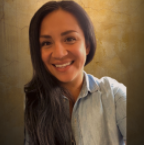Mari Cerda, an amazing human who is working across multiple channels to improve the field of behavior analysis, participated in an interview for this month’s Connecting the Dots blog.

Mari, can you introduce yourself and maybe provide a few “categories” of how you identify?
I’m Mari, my pronouns are she/her. I’m indigenous. I’m a mom and a wife. I’m autistic. I’m trying to navigate the world and our field, and my role in how we can make the world and our field better.
How were you introduced to the field of behavior analysis?
I was a special education teacher. I worked in a middle school with difficult students; the doors locked behind you when you entered the school. I worked at that school for 13 years. In 2003 there was a BCBA that worked with me, she taught me that the science of behavior analysis was about understanding your behavior, so that you could understand the relationships with those around you. I applied the knowledge to my own behaviors and understanding how my behaviors impacted others, primarily how my behavior impacted my students. The way she taught me to use the science was to understand where the kids were coming from and where my behaviors were coming from it completely shaped how I understood myself and how I worked with my students.
What attracted you to the field/science?
Behavior analysis was a very clear-cut way to have a better understanding of myself. It gave me a better grasp to navigate my own world. I was never taught that that behavior analysis was exerting power over others, it was never manipulative, it was never to get someone to do something that I wanted. I wanted to get “in” to this and to help kids understand about why they do what they do. Behavior analysis provided me a framework to understand the world. Now I see the field as a bridge between neurodivergent and neurotypical people. Why does our behavior function in certain ways?
Your Instagram account, the.bilingual.bcba is very active. What motivated you to start the channel?
I started the account many years ago, like 2013/14, and it has morphed over the years. Originally it started out as a personal way to stay in touch with people. Instagram was a better fit for me than Facebook, less toxicity less negativity, over the years it has evolved. The term bilingual means a lot more than just language bilingualism. I am bilingual in Special Education and ABA. And more recently, as I have become more comfortable about my own diagnosis, I am neurobilingual. I’ve learned how to engage with neurotypical’s in a way that they are responsive. The bilingual concept is ever evolving.
What do you hope people learn from the.bilingual.bcba channel?
Our field has not “arrived,” and we never will arrive. There is a better way, there’s always a better way. We are always evolving and improving. Everyone has a role in this evolution of our field. In our lifetime, there will be people who will engage in advocacy for our field, then there will be people who want to get rid of the field. I want to reach at least one person working with an autistic individual and improve their understanding of “you don’t have to do it that way.” I want the field to move to place where it values autonomy, and values neurodivergent traits or essence.
Share a little bit your new organization, the Lighthouse for Equitable Access and Practices (LEAP).
LEAP is a nonprofit; our mission is to address the disparity of diverse practitioners in our field. We believe in the evolution and reform of the field, and the best way to reform the field is to support and supervise the next generation of professionals to become compassionate and neurodivergent affirming practitioners. We are a new organization, just formed in January 2021. We provide scholarships for supervision to increase equitable access for marginalized groups entering into the field of behavior analysis. We launched our first official supervision cohort with 10 supervised students and the first LEAP participant just passed her exam! We are now accepting scholarship applications for the next cohort.
Why do you think it is so important to have autistic/neurodivergent professionals in the field of behavior analysis?
Because we are your walking social validity measures.
What’s a last take-away that you would like readers to know?
The highest form of respect and love for something is to hold it accountable. We, as behavior analysts, need to be held accountable. We can disrupt and do the least amount of harm to all involved if we do this right. Everyone should be free from harm.
Mari Cerda Bio
Mari Cerda is an Indigenous-Mestiza woman, wife, mom of 3, Autist, and board-certified behavior analyst. She is currently completing her doctoral dissertation at Texas Tech University. Mari is the co-founder of The LEAP (Lighthouse for Equitable Access and Practices) Institute, a non-profit whose mission is to increase equitable access for marginalized groups entering the field of applied behavior analysis through quality supervision support and testing scholarships. When she is not working on one of many projects, Mari enjoys retreating into her home with her family and spending time in her gardens to recharge.
